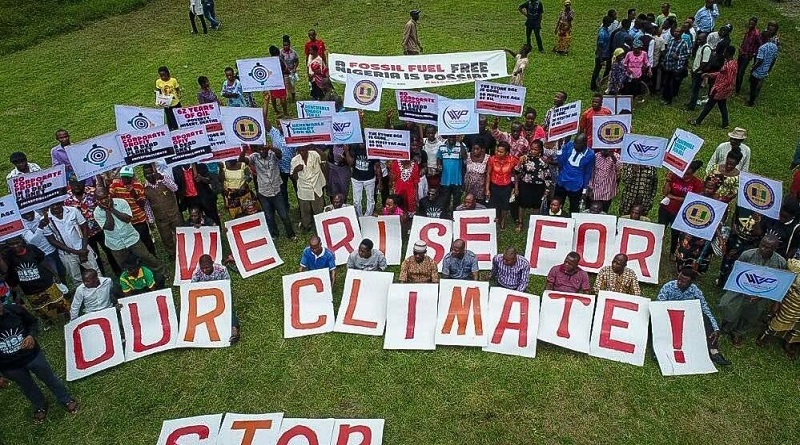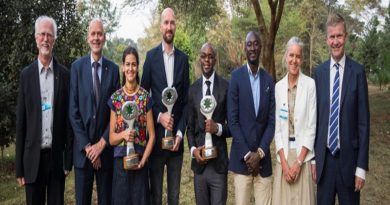COP26: CSOs call for ambitious proposals from govts to move discussions forward
As week one of the UN climate talks here in Glasgow conclude, civil society representatives call on governments to get serious on the real substance of the negotiations and come up with ambitious and concrete proposals to move discussions forward in the following week. With thousands of people marching in the streets in Glasgow at the weekend, it is clear that public demand for accountability to tackle the climate crisis is increasing and governments can no longer ignore the power of the people.
Tasneem Essop, Executive Director, Climate Action Network: “As week one of COP26 comes to an end, people are taking to the streets today demanding justice. So far COP26 has been high on grandstanding climate declarations and pledges and low on real commitments, especially on finance and importantly, finance for loss and damage caused by climate change. Next week must be a return to the drawing board to finalise a plan that truly responds to the needs of people on the frontlines of the climate crisis. We demand that leaders step up and deliver real solutions and not just smoke-and-mirror declarations.”
Fernanda Carvalho, Global Policy Manager, Climate & Energy Practice, WWF: “Week one has seen progress, mainly outside of the formal negotiations, but the announcements made by leaders and other actors alone will not deliver the step change needed to tackle the climate crisis. With a number of headline commitments on forests and land use, backed up with finance, and increasing recognition of nature’s fundamental role in securing a 1.5C pathway, Glasgow is already the ‘nature COP’. We urgently need it to also be the ‘delivery COP’.
Teresa Anderson, Climate Policy Advisor, ActionAid International: “Week one of COP26 has been marked by a series of glitzy, high-profile announcements from rich countries. But there is a danger this is becoming a negotiation-free climate negotiations.
“These announcements look shiny but lack substance. The commitment from the financial industry that trillions of dollars are being mobilised to meet Net Zero, is a smokescreen for business-as-usual with no plans to end reliance on fossil fuels. Instead of shaping real transformation, most of these targets are likely to depend heavily on carbon offsets, which drive land grabs and human rights abuses in the Global South.
“In week two, the focus must come back to the negotiations, building trust and the cooperation needed to limit warming to 1.5ºC and deliver on finance to protect frontline communities.”
Mary Church, Friends of the Earth Scotland, Head of Campaigns: “We’ve seen lots of fine words and polished speeches from world leaders, but this week’s wave of announcements and pledges should not distract from the actual negotiations that must deliver real emissions cuts and support for the countries and people on the front line of the climate crisis.
Many of the pledges sound superficially good, but they are light on detail, with targets in many years time, and little in the way of accountability. We need action to cut climate pollution from dirty energy now, not fantasy techno-fixes or dodgy offsetting schemes.
Urgently needed climate finance owed by rich countries to enable nations on the frontline of the climate crisis to move away from fossil fuels and deal with the impacts of climate change is also still missing.”
Jennifer Morgan, Greenpeace International Executive Director:”COP26 must deliver on ambition and justice, and despite a few rays of sunshine, countries are just not trying hard enough.
Glasgow has seen some important announcements, making it clear that the fossil fuel industry is on the back foot. Coal is packing its bags, with strong moves from Vietnam and Ukraine, but details are yet to be nailed down and Poland is an outlier.
The big test for COP26 success is finance, adaptation, and loss and damage. To meet the ambition and action required, countries have to get out of their comfort zones now.”
Colin McQuistan, Practical Action’s head of climate and resilience: “It has been a week of contrasts. On the one hand, we were shocked to hear the announcement of the Agriculture Innovation Mission for Climate, launched at COP26 and led by the United Arab Emirates and the United States. This programme threatens rural livelihoods, accelerating the switch to industrial farming, driving more people off their farms and into urban areas. We need a future for farming that recognises the value of smallholder farmers and less intensive farming systems, not shut them down. Unbelievably, this has a growing list of supporting countries, despite the fact it overlooks the central role of billions of smallholder farmers.
On the other, there has been a significant shift by a large group of industrialised countries. The high ambition coalition now recognises that loss and damage are experienced in all countries and regions, especially in vulnerable places. This commitment by a major negotiating block is a positive start. As we come to the end of the first week, we are now at the transition point. The negotiators have resolved most of the easier issues, now we are moving into the difficult terrain, and everyone at COP from Practical Action remains committed to giving voice to the communities we work with and the solutions to climate change they are already pioneering.”
Olha Boiko, coordinator of CAN EECCA: “We have seen some good signs from the countries of Eastern Europe, Caucasus and Central Asia. Ukraine has committed to phase out coal in electricity till 2035. Currently Ukraine, Russia and Kazakhstan have committed to climate neutrality till 2060. Seems like Kyrgyzstan and Armenia are carefully commiting to be climate neutral by 2050. There is a first ever Central Asian pavilion filled with events during COP. Our region is becoming more visible, but without concrete actions on the ground and meaningful civil society participation in between COPs – the world will not believe that EECCA countries are serious about climate action. We need to see real changes in access to information, no repressions on CSOs and concrete action plans for every beautiful commitment told in front of an international audience. “
Sven Harmeling, Global Policy Lead Climate Change and Resilience, CARE International:“While action announcements made by groups of countries on things such as phasing out coal, pulling finance out of fossil fuels or reducing methane can add to the growing momentum, their actual implementation is what counts for the climate. Thus, such initiatives must not make the world forget the big action gaps, and the hypocrisies, that still exist on emission reductions and the provision of finance for the most affected areas and people, especially women and girls in developing countries. It is time for developed countries to no longer stand in the way of actions to respond to the growing calls for additional finance to address the growing loss and damage in vulnerable countries that we heard in week one of COP26.”
Hellen Neima, Africa Climate Campaign Director at Corporate Accountability:“Week one has been a show of power and manipulation, with Global North governments knowing what catches the attention of some Global South governments….which is money.
As an African climate justice activist, it was difficult to watch African governments throw in the towel and shut their doors on us, the people, and our cry for real solutions. Forgetting very fast how polluting governments and corporations have refused to pay their historical debt in finance and loss and damage talks, just for a little promise of a share of proceeds off article 6.2 and 6.4 market mechanisms…forgetting that these mechanisms effectively send greenhouse gas emission soaring and spurs even more crises like our food security, land, livelihoods and our very existence in this world, we need African governments to stand up and do what we sent them to COP for—delivering real solutions.”



